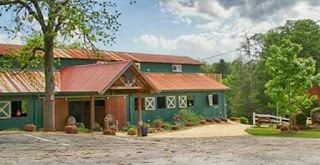Goat, Goat!
The Barn at McKenna Farms
You
can’t say we weren’t warned. The day before our visit to McKenna Farms, We saw
the Facebook post: Nigel, a baby goat, had arrived at the farm.
“Cute,” we thought, “very cute.” We had no idea.
We pulled into the parking lot between school dismissal and
dinner time, a very popular time slot. The parking lot was nearly full, and as
we rounded the corner of the farmhouse, waiting parents and siblings filled the
porches in the warm spring weather, though a number of families had drifted off
toward the barn to see the new baby goat.
The last time we were here the new waiting room was
nearing completion, piled with furniture. Now we take a look inside, where more
parents wait for their children. We’re drawn to the striking painting on the
wall, a farm, painted by the grandmother whose granddaughter comes to the farm
for therapy.
Then, approaching from the barn, we saw some familiar
faces: Melissa and her twins, Cameron and Landon, two sweet boys Jacob’s Fund
had sponsored. The boys are taller now, and they have a baby sister who is
hardly a baby any longer. Melissa and I hugged, and each of the twins met my
gaze and greeted me.
The buzz around us echoed as everyone who passed by
coming from the barn said to those going toward the barn: “Have you seen Nigel?
You’ve got to see Nigel.”
Of course we had to see Nigel, too.
Charlie's little sister holding Nigel
We found him in a horse stall all his own. Jackson,
Jessie’s older son, perched in the stall window, overseeing Nigel’s activities
and visitors. Jackson has great plans for Nigel; he can’t wait to build a Nigel
house. He held Nigel up for me to pet, and I was hooked on Nigel at that point:
his sweet little face, his patience with all the humans popping around him like
soap bubbles, his eager playfulness.
His space had been furnished with all the things a goat
needed: hay to chew on as he learned to eat big-goat food (it also served as an
edible sleeping mat), an incline propped on a hay bale so he had something to
climb on, water, and toys. He was
surrounded by kids and adults petting him and watching him hop, climb, and
gently butt his head against the forest of legs in the stall. While we were
there, McKenna Farms’ vet stopped by to give advice on when six-week-old Nigel
could stop taking milk from a baby bottle every eight hours (a volunteer has
been working the night shift to keep Nigel well-fed) and begin solid food. We
were every bit as enchanted with this little goat as the children were.
Over the next day and a half, we were to learn that
Nigel, a whiskered furball not much bigger than a large cat, was already unwittingly
starting to earn his keep.
Jacob H. and his mom
Charlie, behind his mom and little sister
Our appointments the next day were with Jacob H. and his
mom, and Charlie and his mom. By the time we caught up with Jacob H. and Misty,
they’d already visited Nigel, and Jacob broke into a smile when Nigel’s name
was mentioned. Charlie and his sister, Sarah, too, had visited Nigel before his
therapeutic riding session. After
talking with the family, Sarah and I found ourselves back at Nigel’s stall,
where she ducked inside to get some hands-on goat time. I made sure the stall door stayed latched as
the parade of visitors continued.
That afternoon Jonah and Amy stopped by. Jonah was
clearly enamored. “Goat, goat,” he said, pointing in the direction of the barn.
One-on-one therapy is very important to a child with
developmental impairments, so much so that social development is often
overlooked, or regarded as incidental, a byproduct of being in the world with
others. But social interactions are important to our emotional and mental
health, whether we are adults or children. Kids’ social groups can help model good social
behaviors, and allow children to see how what they do or say affects others. They learn how to cooperate for a better
outcome.
And here is Nigel with friends in a cooperative play
activity that . . . well, take a look (that’s Jonah on the left):
Taking Nigel for a walk
Need I say more?
Watch this space for more about Jacob H. and Charlie, coming soon.
We
welcome your questions and comments about Jacob’s Fund and hippotherapy and
therapeutic riding.
We’re
pleased you’ve visited our blog and we hope you will be inspired to contribute
to the scholarships Jacob’s Fund provides for children with developmental
impairments. You can reach us at:
1630 Tipperary Drive
Middletown, Ohio 45042-3875
513.423.0108
Jacobbeachfund@gmail.com






Comments
Post a Comment